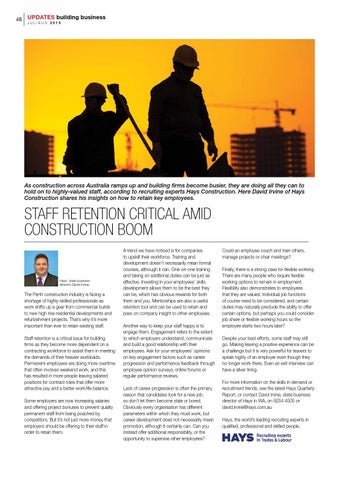48
UPDATES building business JUL/AUG 2015
As construction across Australia ramps up and building firms become busier, they are doing all they can to hold on to highly-valued staff, according to recruiting experts Hays Construction. Here David Irvine of Hays Construction shares his insights on how to retain key employees.
STAFF RETENTION CRITICAL AMID CONSTRUCTION BOOM
Hays’ state business director David Irvine.
The Perth construction industry is facing a shortage of highly-skilled professionals as work shifts up a gear from commercial builds to new high rise residential developments and refurbishment projects. That’s why it’s more important than ever to retain existing staff. Staff retention is a critical issue for building firms as they become more dependent on a contracting workforce to assist them in meeting the demands of their heavier workloads. Permanent employees are doing more overtime that often involves weekend work, and this has resulted in more people leaving salaried positions for contract roles that offer more attractive pay and a better work/life balance. Some employers are now increasing salaries and offering project bonuses to prevent quality permanent staff from being poached by competitors. But it’s not just more money that employers should be offering to their staff in order to retain them.
A trend we have noticed is for companies to upskill their workforce. Training and development doesn’t necessarily mean formal courses, although it can. One-on-one training and taking on additional duties can be just as effective. Investing in your employees’ skills development allows them to be the best they can be, which has obvious rewards for both them and you. Mentorships are also a useful retention tool and can be used to retain and pass on company insight to other employees. Another way to keep your staff happy is to engage them. Engagement refers to the extent to which employers understand, communicate and build a good relationship with their employees. Ask for your employees’ opinions on key engagement factors such as career progression and performance feedback through employee opinion surveys, online forums or regular performance reviews. Lack of career progression is often the primary reason that candidates look for a new job, so don’t let them become stale or bored. Obviously every organisation has different parameters within which they must work, but career development does not necessarily mean promotion, although it certainly can. Can you instead offer additional responsibility, or the opportunity to supervise other employees?
Could an employee coach and train others, manage projects or chair meetings? Finally, there is a strong case for flexible working. There are many people who require flexible working options to remain in employment. Flexibility also demonstrates to employees that they are valued. Individual job functions of course need to be considered, and certain duties may naturally preclude the ability to offer certain options, but perhaps you could consider job share or flexible working hours so the employee starts two hours later? Despite your best efforts, some staff may still go. Making leaving a positive experience can be a challenge but it is very powerful for leavers to speak highly of an employer even though they no longer work there. Even an exit interview can have a silver lining. For more information on the skills in demand or recruitment trends, see the latest Hays Quarterly Report, or contact David Irvine, state business director of Hays in WA, on 9254 4505 or david.irvine@hays.com.au Hays, the world’s leading recruiting experts in qualified, professional and skilled people.
